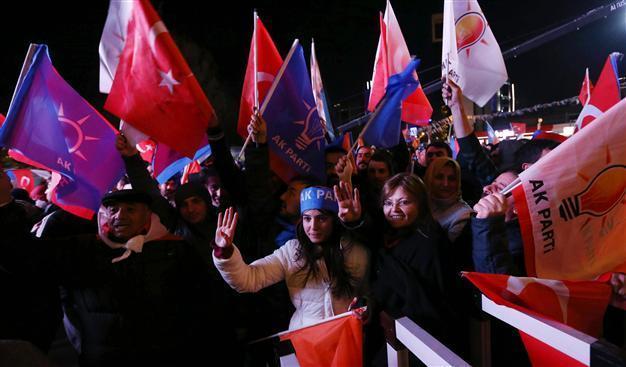ANALYSIS: The naked truth of Turkish politics

Supporters of the ruling Justice and Development Party (AKP) cheer as they follow the election's results in front of the party's headquarters in Ankara. AFP photo
Here is the naked truth: Half of the corruption claims in any other democratic country would be enough to collapse the government; in Turkey it cost only a 5 point drop in support for Prime Minister Tayyip Erdoğan in the March 30 local elections.It is also true that Turkey hasn't experienced an election with so many fraud claims in decades. Power outages in critical districts of critical cities like Istanbul and Ankara on election night; the replacement of poll box observers of the ruling Justice and Development Party (AK Parti) during the vote count, allegedly by street bullies to intimidate observers from other parties, especially in Ankara; attempts to prevent poll observers from being in the room during voting, especially in the east and southeast of the country...
Those claims could have changed the result in some cities, but let’s face the truth: The difference between the AK Parti and others is not in the single digits. Istanbul and Ankara could have changed the picture, but they did not. The majority of Turkish voters have closed their eyes and ears to the corruption claims, because Erdoğan told them to do so. He still has such an influence on them.
There is another dimension of the story. To be frank, Kemal Kılıçdaroğlu of the main opposition Republican People’s Party (CHP) did his best in the campaign. The candidates he picked for Istanbul and Ankara were not ideologically shaped figures. Mustafa Sarıgül in Istanbul is a populist politician who could find a place in any party. Mansur Yavaş in Ankara came from a nationalist background, but is known as a moderate figure.
But the CHP’s competition with the AK Parti is an unbalanced one, because the CHP does not exist in practical terms in almost a third of the country, especially considering the Kurdish populated east and southeast. In big cities with large Kurdish populations like Diyarbakır, the CHP received under 1 percent of the vote. In Şanlıurfa it was 0.9 percent. In Van it was 0.8 percent. But the Ak Parti managed to defeat the Kurdish problem-focused Peace and Democracy Party (BDP) in Şanlıurfa, for example, and lost in the other two only after an exhausting race. The non-existent situation in the Kurdish regions could be understandable for the Turkish-nationalist oriented Nationalist Movement Party (MHP), for example, but not for the CHP with its social democratic and populist program.
Erdoğan’s political recipe based simply on antagonism won again. This time, the subject of antagonism were the supporters of Fethullah Gülen, the prime minister's former ally moderate Islamist scholar living in the U.S. who is accused of staging a coup against Erdoğan by bringing up corruptions claims. Erdoğan had vowed to root out the Gülenists during the election campaign and now there is no reason not to carry out that promise, as he will take the election results as a license to do so.
Now, Turkey will enter the presidential elections in August. Its campaign will start in June. Some 45 percent is enough to win an eighth poll since 2002 for Erdoğan, but it will not be enough for the presidency, for which 50 percent plus one vote will be needed. Kurdish voters could be attracted for that, as the BDP is locked on regional autonomy. But how will the AK Parti's voter base respond to that prospect? Erdoğan might come up with another issue to fit his antagonist recipe, but now is it time for him to enjoy victory.











